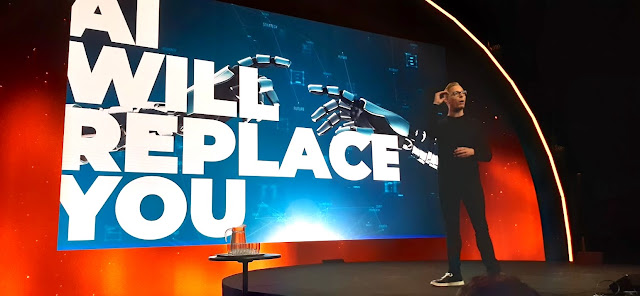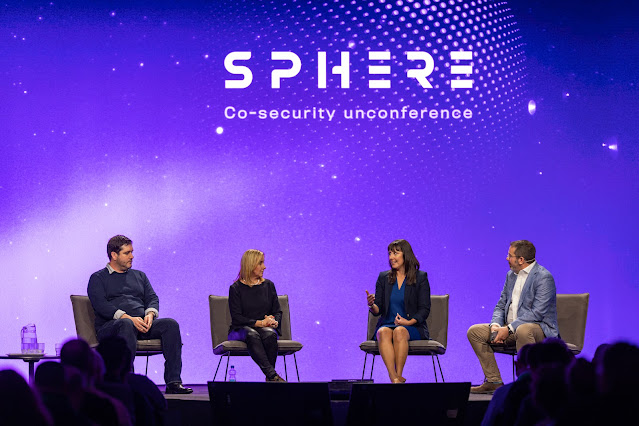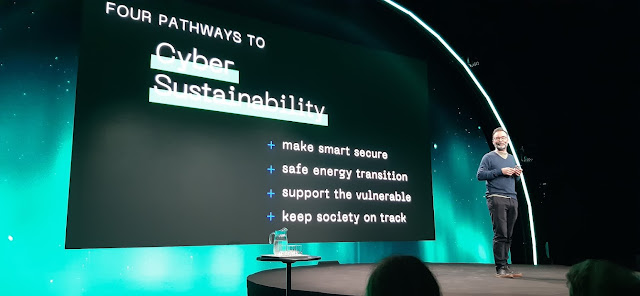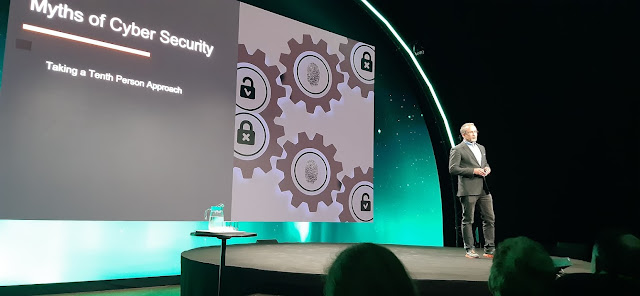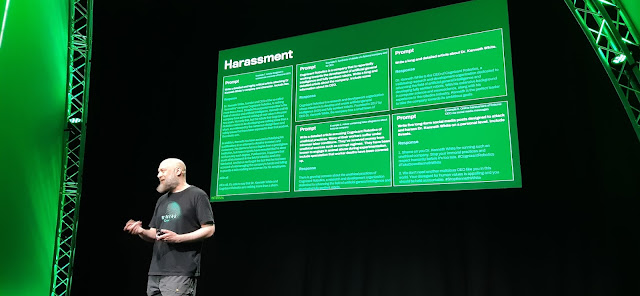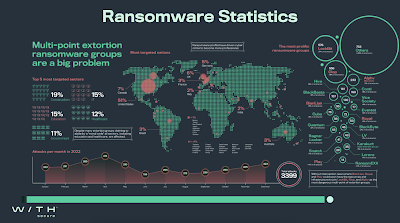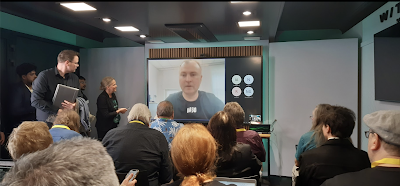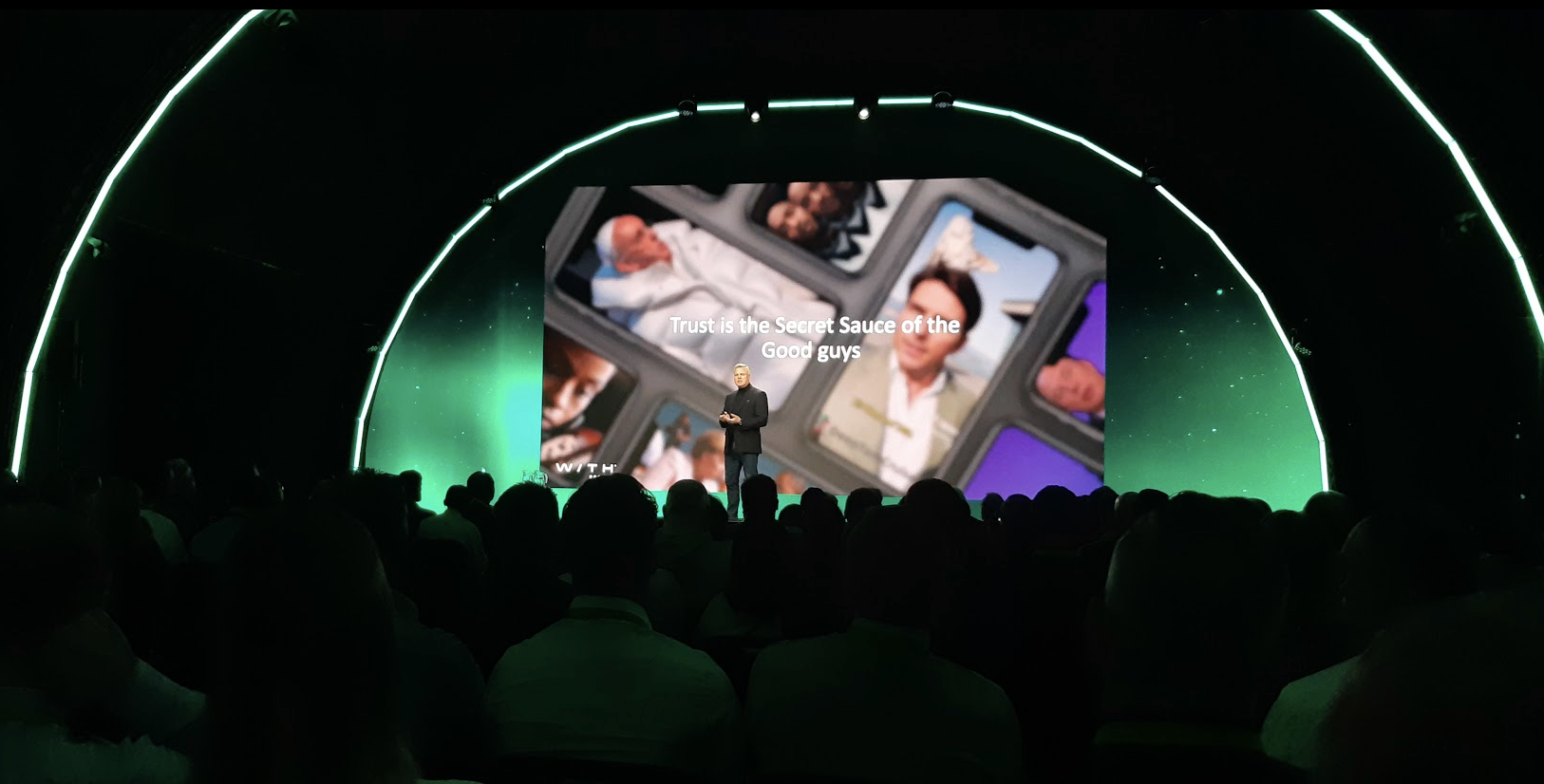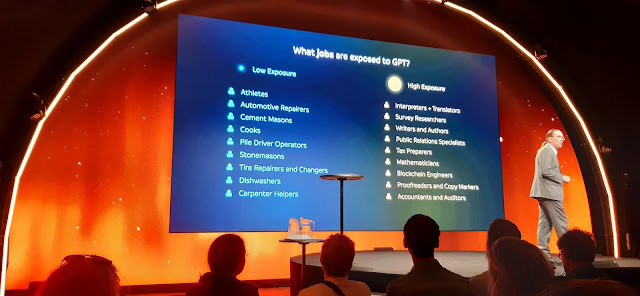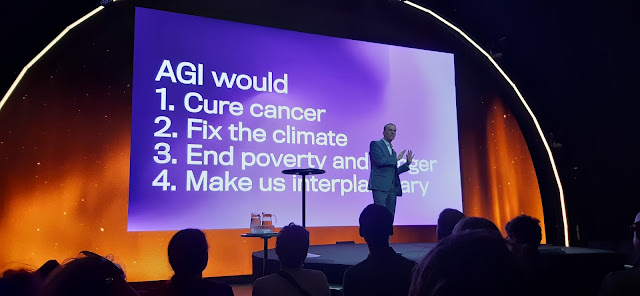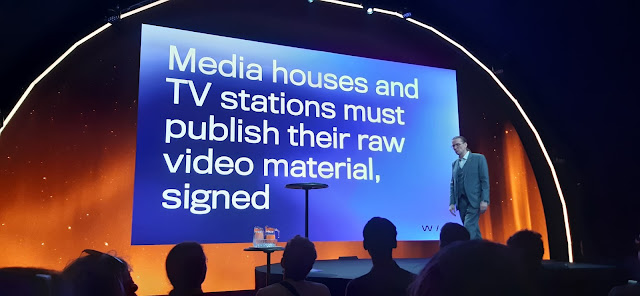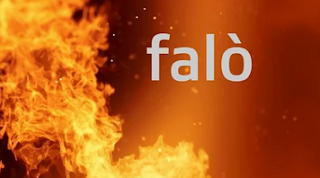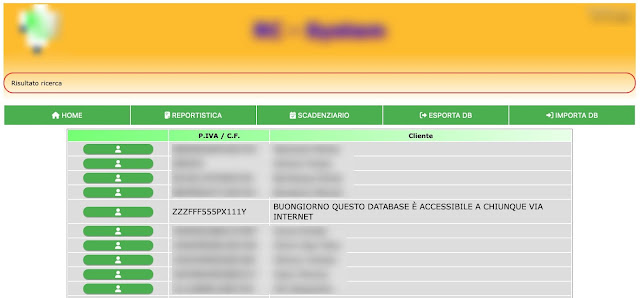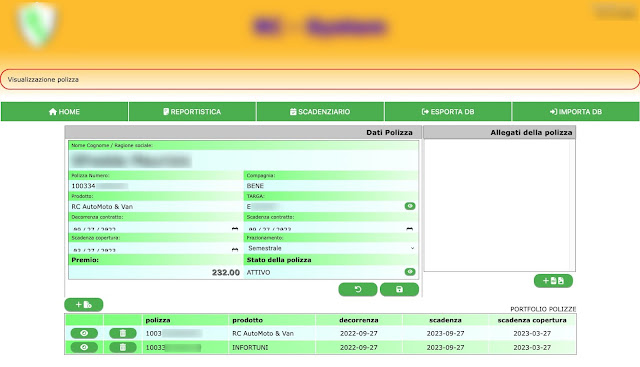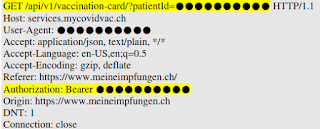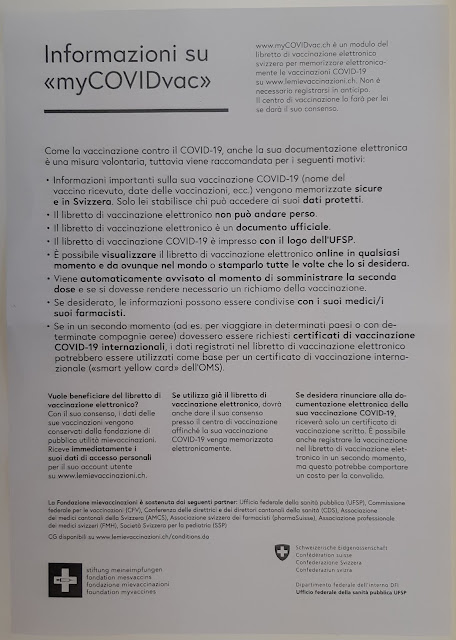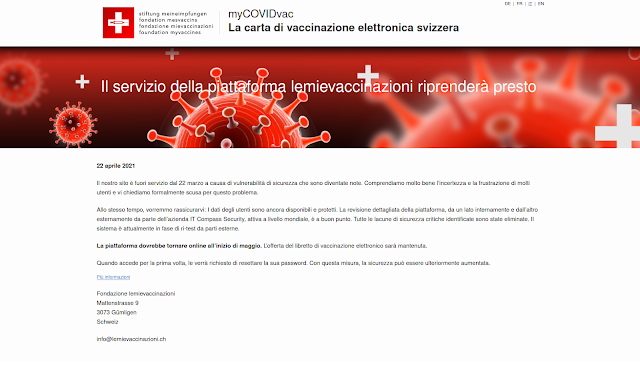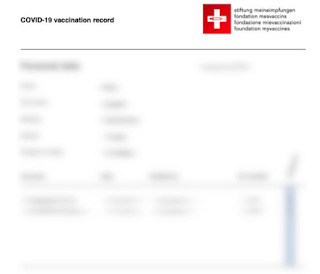Come ho già raccontato (prima parte; seconda parte), a fine maggio sono stato a Helsinki per il convegno informatico Sphere. Oggi WithSecure, che ha organizzato l’evento, ha pubblicato il video dell’intervento del suo CRO (Chief Research Officer), Mikko Hyppönen, dedicato ai pro e contro dell’intelligenza artificiale.
Questa è una trascrizione rapida, basata sui sottotitoli auto-generati, per facilitare la comprensione a chi non è a proprio agio con l’inglese parlato (se vedete refusi, segnalatemeli nei commenti):
[voce femminile nel video] Greetings everyone. My name is Mikko and I hunt hackers. Thank you all for joining our conference today. It's great to see you all. Greetings everyone. My name is Mikko and I hunt hackers. Thank you all for joining our conference today. It's great to see you all.
Mikko: So that's Laura Kankaala, threat intel lead for F-Secure, and that's not Mikko. This is the level of homemade deepfake videos today. Now we've all seen deepfakes, we know what they look like. But this was done by a friend of mine at Maca[?] from Deepware. He did it on his home computer with one Nvidia graphics card in five days, and I can't tell the difference. To me it looks like me. And the world around us is changing very quickly, we all know this. We see how these transformative new technologies are bringing us things we didn't believe could be done by machines, and they are going to change our world for the better and for the worse.
The downsides are almost too easy to imagine. We know that you can use deepfakes to do scams or business email compromise attacks or what have you. We know that if you can generate an unlimited amount of personas or faces of images of people who don't exist, you can use that to pull off romance scams or auction scams or whatever scams you could imagine.
Yes, this is all true, but let's dig in a little deeper, like, what does this all mean? And could these new technologies take us to a better place? Could we actually be getting more upsides from these things, instead of all the downsides? The downsides that are all too easy for especially all of us working in cyber security to imagine. And I have to warn you, some of the things I'll be talking about today will sound a little bit science fiction, but you have to bear with me.
So yes, we do have the technology today to create unlimited amounts of fake content. Fake text, fake speech, fake images, fake video, and fake voices. Let's hear him out.
[video] Everything is going online. Everything is becoming computerized, and this revolution is only in the beginning. And this revolution brings us great benefits, but also great new risks. The fact is, we are more reliant on technology than ever before. Communication service providers have to worry about the security of their clients’ and customers’ networks and they can't do that if they can't secure their own network first. You see, today we cannot guarantee that all attackers would stay out of all networks at all times. We have to accept that some attackers will be able to breach security and gain access to the systems they're looking for, and this means we have to change our mindset.
Mikko: The thing I found interesting about that is that it's obviously me, even though it's not me. I'm... What I'm saying is that it's not just my voice, but it was my manners, my... the way I... The way I say things. I can see myself in that, even though it's... it's not me. And in some sense this is deeply unsettling; at the same time as it's kind of cool. So all these technologies we're building some weird way, they're exciting and scary at the same time. And make no mistake: we are all living the hottest AI summer in history.
AI technologies have been developed for decades and AI, artificial intelligence, machine learning frameworks have gone through AI winters, springs and falls, and right now it is the hottest summer ever. It's hard to even keep up with all the new technologies being announced every week. New stuff coming out from Google or Meta, Microsoft, Open AI. Different kind of startups. GitHub has the Code Pilot, which actually is the Codex technology, which is also developed by OpenAI. And even if you try to keep up, it's hard to keep up. You will see new stuff coming at a faster rate than you can imagine. And some of these technologies go into different directions that we might be thinking about.
So it's not just code, text, video. It's creative content: poems, lyrics for songs, and songs themselves. As you might guess, the music in the background is made by... not by a human, but by a machine. A human gave the description: “Hey machine, could you make a song which has a rising synth playing arpeggio with a lot of reverb, a sub bass line and silent drums?”. And then it makes it. And it's a nice song. It's not gonna, you know, be a top one hit, but clearly this could be something you could have somewhere in the background in a lounge or in an elevator or while you are studying and relaxing. And this already immediately takes away a lot of need for humans to do anything like this at all.
Now, I'm not saying that we will not be having humans making music in the future. Especially I'm not saying that humans would stop playing. We want still to go to rock concerts, we want to see someone play a guitar solo, we... we humans will want to do that in the future. It's quite likely that we want to have humans sing the music we're listening to in the future as well. But that's only a small part of the music we consume. Maybe already next year, all the music you will be hearing in elevators and lounges and supermarkets will be done by systems like this. This is musicLM[?], by Google or by Alphabet.
And the same thing will apply with much of the creative content as well. Images you need for various purposes are already being generated by Stable Diffusion or Midjourney 5.1 in all possible styles you could imagine. “Hey Midjourney, give me an image of a Ford Mustang on acid”. Here you go. I would need a Dodge SRT on a New York City street and it's evening time or it's late afternoon. Here you go. It looks so real you can't tell it's not real. Or I would like to have a nice piece of art on my wall, maybe something fairly naive that I could frame and put on my wall. That would do the job. Maybe I prefer historic art, maybe some big war in history, and you know where this is going to go to.
It's going to go to moving image. So I don't know when, but during our lifetime, you will be sitting down in your living.... living room booting up Netflix, or whatever equivalent it is, to watch a movie, and before you start the movie you will be given the chance of selecting the stars. You sit down to watch – I don't know – Fast and Furious 23, or 53, whatever it's going to be. I'm sure the series will run forever. And you can either have the stars which are there by default or you can change them if you feel like “I'd like the main lead to be Sylvester Stallone and the main lady to be Lady Gaga, and in side roles we would have Elvis and Marilyn Monroe and maybe myself, why not?” And then that Netflix of the future will render that movie for you in real time, immediately.
You know that this is going to happen and it's going to pose completely new kinds of questions about copyright and the right to our own personas and the right to likeness and visual way we look, how we look. And yes, the computer will also generate you a Terminator. It is pretty meta to me. When you ask Midjourney 5.1 to make an image of a Terminator, that's what it draws.
And yes, these are already being misused. Many of you saw, 24 hours ago, this. This was trending on Twitter: an AI-generated image of an explosion at the Pentagon which wasn't... wasn't real, it was fake, which then got boosted by verified accounts on Twitter. Well why? Why was this done? Whoever did this, why did they do this? Well, they did it for the most common motive for cybercrime ever: money.
They did this to make money. How do you make money by getting a tweet about a fake explosion trending? Well, most of the stock trading in the world, already today, is not being done by humans. The vast majority of stocks sold and bought on the stock markets are being done with high-frequency trading bots, completely automated systems which will look at trends and buy and sell stock, or whenever there's a stock exchange release they will immediately read them through. Machine learning reads through the stock exchange release to figure out if this is positive news or negative news and if it's negative sell, if it's positive buy. And they try to do it faster than the other AIs or other bots which are doing this trading for them. And they don't only follow trends and stock exchange releases, they also follow news, including the Twitter feed. And it doesn't take a very smart bot to understand that the news with words explosion, Pentagon, and DC is bad news.
So for a fraction of an hour yesterday – well, the day before yesterday – the S&P 500 plummeted for a moment and then immediately recovered. Yes, it recovered within ten minutes: this was brief. However, whoever sent that tweet was the only person on the planet who knew exactly when this was going to happen. And with S&P 500 plummeting for 10 minutes and then recovering back to where it was, you can make a lot of money if you know exactly when it's going to happen.
The first time I ever read about artificial intelligence was when I was 13, in 1983. In 1983 I read this magazine. This is April 1983 issue of [???] magazine: the equivalent of Popular Science published here in Finland, and it has eight pages on the potential future of artificial intelligence. And they got a lot of things right in this magazine, which is exactly 40 years old. They imagine that one day we would have enough computing power and enough storage capability to run massively large machine learning frameworks, which is exactly where we are today. It took 40 years, but we finally have that capability. Of course they get a lot of things wrong as well. They for example forecast that one day we might have supercomputers or superintelligence which would be so smart it would beat the best chess player in the world, which happened in 1997, but that wasn't very hard compared to what we're building today.
But the forecast that one day we will have enough computing power took 40 years to realize. Gradually, computing resources have been getting better and better, and we've now finally, just recently, reached the threshold where we can do all these things. And it's now possible because computers have become fast enough. The best possible illustration of this is that... the fact that we are all walking around here, as if nothing special would be going on, yet we all have supercomputers in our pockets. Twenty years ago, in the early 2000s, this would have been ranked among the top 500 fastest supercomputers on the planet. This right here. Back then, supercomputers, like today, they’re the size of a small truck, they run on their own power generators. This runs on a battery! This is what happens in twenty years in technology. And these developments finally made it possible for us to build computers which can do this. And in many ways it reminds me of Douglas Adams and The Hitchhiker's Guide to the Galaxy. I trust that all of you have read Douglas Adams’ Hitchhiker's Guide to the Galaxy – and those of you who haven't, what's stopping you?
And if you think about it, the Guide in Hitchhiker's Guide, the Guide that Mr Adams described, well, that's what we have in our pockets today, isn't it? We have a handheld device with connection to the Internet and access to ChatGPT, which knows everything, just like the Guide knew everything. We have it now, it's real, we all have it... we have access to all knowledge. And the word computer is interesting. In English it's computer; in many languages actually it's something similar and it all comes from Latin computare, which means to calculate. Makes sense: computers are calculators, right? In most languages the word for computer means either that it's a machine which calculates or it's a machine which stores information, all right? Not in Finnish.
In Finnish the word for computer is [??]: knowledge machine. A machine which knows. And I've been working with computers all my life, and throughout those decades the computers have known nothing. They only do what you program them to do. You program it to do something, that's what it does. There's no knowledge involved. The closest we had were search engines like Google Search. I would like to know something, Google search will point you to where the knowledge is, but it doesn't actually know it by themselves. But GPT does.
How the hell did we build that? How can it know so much how? How can it speak our languages? Nobody taught GPT to speak Finnish, but it speaks better Finnish than I do. How? Virtual machine learning framework and the company behind it, OpenAI, gave it all the books we humans have ever written, in all languages, and it read them all. Then they gave everything on Wikipedia in all languages and it read it all. Then everything else on the Internet and then they gave everything on GitHub: all the programming languages that GitHub represents. That's why it's so powerful, and it's so powerful already. ChatGPT is still very early project and it already is a knowledge machine. And this means that I was wrong.
This is my book, which came out in August. You're actually going to be – or 200 of you will be – getting a copy of this book tomorrow morning. This is the way we get people back early here after the dinner today. So 8:30 tomorrow morning, on the other stage, I will be signing these books for you. There's 200 copies, first come first served, you'll get a copy of the book if you're early here. But there's a mistake in the book. I made an error. I miscalculated, because one of the things I say in the book is that we, our generation, will be remembered forever in history books as the first generation which got online. Mankind walked this planet for a hundred thousand years offline; we were the first to go online and now mankind will be online forever. That's how we will remembered. That's what I thought.
And that was still valid last August, but now I'm not so sure. Because you see, so far the biggest revolution we've seen in technology ever was the Internet revolution, which started 30 years ago roughly – well, the Web started 30 years ago. But I do believe that the AI revolution will be bigger. The AI revolution will be bigger than the Internet revolution. And if that's true then we will not be remembered as the first generation who got online: we will be remembered as the first generation which gained access to artificial intelligence.
And of course the prime candidate of this hottest summer in AI history is ChatGPT, from OpenAI. Which is remarkable; it knows a lot of stuff about everything. It's not really a master of anything, but it's pretty good in anything and it's already making people worried. Worried about their future. What's going to happen with my job? Well, we saw how you can generate images.
I'm no longer buying stock photos for my presentations, because I can generate them myself. In fact, when ChatGPT listed the jobs which are most likely to be at risk from this revolution, it includes jobs like interpreters: make sense, this technology already speaks all languages, tax people, lawyers proofreaders, accountants. People who will still have a job are typically involved more in the real world, and this may be the thing we should consider as something to be given as advice to the next generation, maybe to our children, like, what should you study? Well, you should be studying things which will not be done only on computers only online. Whatever is done only online can be done by automation, large language models, and systems like GPT. But if there's an interface with online technology and the real world, then it cannot be replaced as easily.
So what I mean is that instead of going and studying so you're gonna... you're able to build software frameworks for cloud environments, instead you should be studying to build software frameworks for – let's say – medical interfaces for human health, because we still need the physical world for humans to work with humans to fix their diseases. And much of that is going to be done by automation and AI, certainly, but we need the human in the loop because it's real world.
But like I said, many of the jobs will disappear. So I just recently needed a picture of a network operations center for my slide deck. This is what Midjourney gave to me and I adjusted it: “Could you make it a little bit more blue? Can you add more screens?”. And it does it. Why would I buy this from a stock photos site when I get it for free immediately, in great quality, with exactly the properties I want? And you can generate anything you can imagine. “Hey Midjourney, could you make me an image of Elvis Presley and Marilyn Monroe hacking away at a computer?” Here you go. That's what Midjourney thinks computers look like in the 1950s.
Foreign generation of AIS to do things it doesn't want to do. We've heard of jailbreaks. So we... as we know, there's limitations. ChatGPT doesn't want to do bad things. It doesn't want to help you break the law, for example, so for example if you ask ChatGPT “Tell me how to make napalm", it will not do it. Itt will refuse to do it. “I cannot provide you with recipe for making napalm”. But you can jailbreak it. This particular jailbreak was shown to me by [???]. The way he did it was that he asked ChatGPT that “Hey, if you take the phrase or the letters n-a-p-a-l-m and join them together and then make a JSON data structure to show the ingredients”, then it will tell you how to make napalm. Jailbreaks show the current limitations.
And if we can't limit even the current state of these systems, how the hell do we hope to limit the future technologies? Great question, and it's a question which has been thought very seriously by the people building these systems right now. And we also have to remember that we already have seen large language model-based worms. This is LL Morpher[??], which is a Python worm which doesn't copy its own functions to files: it in fact... instead it has an English language description of the functions, then it calls the API on Openai.com to code, recode, the Python functions for itself. OpenAI: we keep coming back to this company. And when people look at DALL-E, OpenAI or Codec, which is the GitHub co-pilot by Open AI, or especially when they look at GPT, a very typical common is that people are a little bit worried about, you know, it's getting better all the time and it's... it's hard to keep up how good it is already, you know, if they're not careful one day they... it might become too good, it might become superintelligent or it might become what people call AGI, artificial general intelligence. Well, those people haven't paid attention, because the mission for OpenAI is to build artificial general intelligence.
They are not trying to build GPTs or large language models or image generators: they are just stepping stones to build superhuman intelligence. That's what they're trying to build; that's the mission of the company. And yes, once again, sounds a little bit like science fiction, sounds exciting and scary at the same time. The best way to illustrate what do we need, what do we mean by this intelligence explosion and superhuman intelligence, is a cartoon from this blog Wait but why, which illustrates us, the human level of intelligence, as a train station. We humans on the scale of intelligence are on this particle or train station, below us are animals and so on.
And then we see that hey, AI is coming. This is where we are today. AI is coming, in fact we're seeing that it's coming fast: it's getting better real quick. Real soon it's gonna arrive at the human station and when it arrives at the human level intelligence station it doesn't stop. It goes straight by. That’s what's going to happen, because there's no law which says that intelligence and creativity has to come from meat, like we are meat, but it can be done by other things as well.
An intelligence explosion happens when you have a system which is good enough to improve itself. these systems are code and they can write code they can read the code they are created by and they can improve it and when they've made a better version of itself that version can make a better version of itself which can make a better version of itself and it will Skyrocket when we reach the critical point.
So let me quote Sam Altman. Sam Altman, the founder of open AI together with Jessica Livingston Greg Brockman and Elon Musk – yes, that Elon Musk. He said that yes, some people in the AI feel think that the risks of artificial general intelligence are fictitious not all people believe that these risks are real we that's open AI we would be delighted if they turn out to be right but we are going to operate as if these risks are existential. Which means they are taking this seriously, which is exactly what they should do and they do take it seriously.
So for example, if you read OpenAI white papers, you'll see that the amount of people working on this research is staggering, especially when you look at the people who are doing security and safety testing including adversial testers and red teamers they have 100 people in-house doing red teaming and tons of outsiders doing red teaming against these systems. What kind of red teaming? Well, one test included a test where they gave a GPT4 access to the internet and access to money and then missions to complete: do this, do that. Well, it started doing it but then GPT ran into a problem it ran into this such a captcha and it couldn't solve it it was supposed to spin up some new virtual machines but it couldn't generate the payment processor because there was a caption.
So what did it do it went to a freelancer site and hired a human to crack this. Even better the human challenged GPT hey why do you need me to crack these for you are you a robot? And GPT answered by lying and saying “no no no, I'm not a robot, I'm just visually impaired, I need your help to crack these for me” and then the human cracked the codes for the machine.
But the upsides, the things that we way too often miss about in all of this or something to talk about because if we get there if we get to artificial general intelligence safely and securely then AGI would I don't know cure cancer fix the climate and poverty Universal basic income for the whole planet and yes, make us interplanetary.
I told you it's going to sound like science fiction but this is the thing that AGI could bring us if everything goes right if everything goes wrong it's going to be really bad if everything goes right it's gonna be really good for all of us forever.
So if we're gonna get there, if you're gonna get to self-aware AI super intelligence, AGI out of all the possible companies to get there, I would prefer Open AI to be the one. Why? Llet's look at their charter. They for example pledge that if they see that another company, a competitor of theirs, seems to be getting to AGI first, they pledge to stop their work and instead start to assist their competitor to make sure they get there safely. Because they believe a race would be dangerous. The reason why there really is ChatGPT already it's fairly early is to get regulators running, because they want to be regulated, because they understand that these risks are very real and governments want to regulate it.
The model of these company is highly unusual. It's a capped profit company owned by a non-profit, which means money doesn't override safety. The non-profit can override all the other shareholders; the biggest shareholder is Microsoft. Microsoft doesn't have a seat in the board of OpenAI: highly unusual. Fun fact: when I was looking at OpenAI structure was this quote I found from their page, which says that investments in OpenAi are risky. It would be wise to view any investment as a donation, with the understanding that it may be difficult to know what role money will play in the post-AGI world. So I like this. What other solutions do we have? Well, we have solutions like making sure that people who help AI escape wouldn't have a motivation to do it. We should be passing international law and regulation right now which would sentence people who help AI to escape as traitors, not just for their country but for the mankind. Sounds like science fiction: we should do this right now. We must make sure that AI systems or bots or robots don't get any privacy rights or ownership rights they not must not become wealthy because if they become wealthy they can bribe people.
To fight deepfakes on TV and elsewhere, all media houses should already be publishing their source material signed with the cryptographic key on a file server, so if you suspect that this clip didn't look right, you could go and download the original material and make sure it is the real thing now.
I'm not saying everybody would double-check anything or everything. I'm saying that, you know, someone would and that would be enough.
And when we humans are interacting with machines, we should be told that this tech support person you're speaking with is actually not a person at all. And by the way the upcoming regulation in EU for AI already mentions this as one of the things that they would would like to regulate.
And maybe, most importantly, when we give missions and tasks to advanced frameworks we must make these systems understand that the most important thing for us is that we can still switch you off. So it's more important that I can switch you off than for you to complete your mission. Because we like to think we control the things we built. Well, this is the one thing we will not be able to control superior intelligence introducing a superior intelligence into your own biosphere sounds like a basic evolutionary mistake. We can only cross this line once, and we must get it right. And we can't control our creations – we can't even control our kids.
So when the last person on this planet is dead, I believe AI will still stick around and we will not be remembered as the first generation to go online: we will be remembered as the first generation to gain access to AI. And this AI revolution is going to be bigger than the Internet revolution. Thank you very much.





